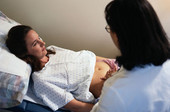
WEDNESDAY, Dec. 1 (HealthDay News) — Women who suffer recurrent miscarriages have a greatly increased risk of heart attack later in life, finds a new study.
Researchers analyzed data from more than 11,500 women who had been pregnant at least once and found that 25 percent had experienced at least one detectable miscarriage, 18 percent had had at least one abortion and 2 percent had experienced a stillbirth.
Over a follow-up of about 10 years, 82 of the women had a heart attack and 112 had a stroke. There was no significant association between any type of pregnancy loss and stroke, said the researchers.
Each miscarriage increased heart attack risk by 40 percent, and having more than two miscarriages increased the risk by more than fourfold. Women who had more than three miscarriages had a ninefold increased risk.
The study, published online Dec. 1 in the journal Heart, also found that having at least one stillbirth increased the risk of heart attack 3.5 times.
The degree of risk associated with recurrent miscarriage decreased when the researchers factored in major heart attack factors such as smoking, weight and alcohol consumption, but the risk was still five times higher than normal.
“These results suggest that women who experienced spontaneous pregnancy loss are at a substantially higher risk of [heart attack] later in life,” the researchers wrote in a news release from the publisher.
“Recurrent miscarriage and stillbirth are strong gender predictors for [this] and thus should be considered as important indicators for monitoring cardiovascular risk factors and preventive measures,” they said.
Dr. Suzanne Steinbaum, director of women and heart disease at Lenox Hill Hospital in New York City and an American Heart Association spokesperson, supports that conclusion and recommends gender-specific risk assessment.
“When evaluating a woman’s risk for heart disease, her risks cannot be defined the same as a man,” said Steinbaum, who was not involved in the study.
“The traditional risk factor analysis traditionally underestimates what a woman’s potential for developing heart disease is,” she said. “The data seen in this trial demonstrates that the obstetrical history of a woman, including miscarriages and stillbirths, must be factored into the risk analysis to determine each individual woman’s risk for heart disease.”
As many as one in five pregnancies ends in miscarriage, Steinbaum said.
Steinbaum noted that many women in the study who experienced stillbirth tended to be less physically active and had higher rates of diabetes and hypertension, which are associated with the risk for heart disease. Those who miscarried more than three times tended to weigh more, which is another risk factor.
More information
The U.S. National Institute of Child Health and Human Development has more about miscarriage.

